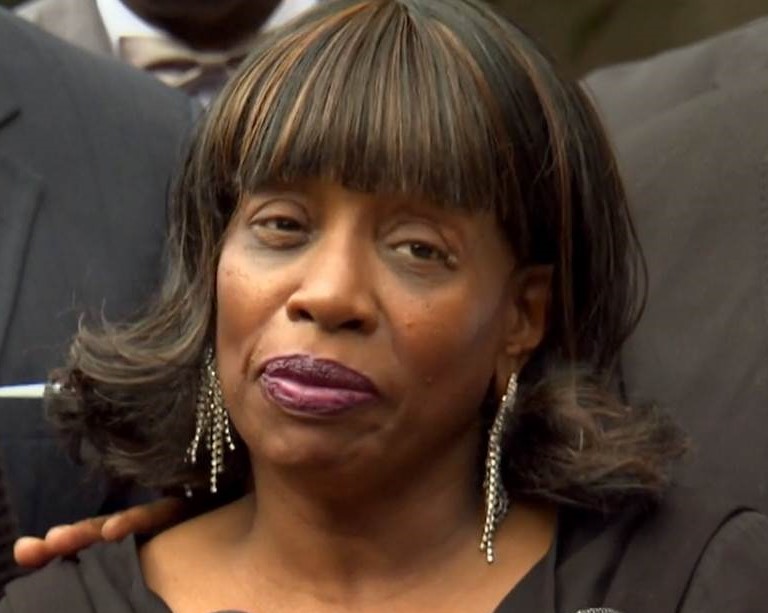
Courtesy Delta Sigma Theta
That night, Jannie Ligons purposely averted her eyes to avoid reading the police officer’s uniform nameplate. Forced to perform oral sex in the back of Oklahoma City police officer Daniel Holtzclaw’s patrol car after being pulled over during a traffic stop in the early morning hours of June 18, 2014, Ligons obeyed the command and focused her gaze on the officer’s gun and holster. And she prayed.
“I didn’t dare look up at that name badge,” says the 57-year-old grandmother, who was who was joined on the phone by her attorney Benjamin Crump. “I was afraid for my life. I knew if I looked up and I saw his name, he would shoot me in my head. I was praying for my life. I didn’t think I would live through it.”
But Jannie Ligons did live through the ordeal, and afterwards she went straight to the cops to report the crime. On January 21, Holtzclaw was sentenced to 263 years in prison after being convicted of rape and other charges. In total, 13 women came forward in the case to testify, providing evidence that Holtzclaw routinely targeted poor African-American women with criminal or substance abuse histories throughout 2013 and 2014. Ligons was the officer’s final victim. She had no record. Hours after she gave a statement to police, an internal investigation against Holtzclaw began.
On Saturday, Ligons will be honored in Atlanta with the Fortitude Award at Delta Sigma Theta Sorority’s annual Celebration of Women luncheon. The other honorees include House minority leader Stacey Abrams; Xerona Clayton, a former aide to MLK and founder of the Trumpet Awards, which celebrate African-Americans who have succeeded against significant odds; Dr. Gwendolyn Boyd, the first African-American woman president of Alabama State University; and Joni Taylor, the first African-American female coach of the woman’s basketball team at the University of Georgia.
“In 2015, there was no woman in America who epitomized the word fortitude more than Jannie Ligons,” explains Bunnie Jackson-Ransom, the luncheon’s media coordinator and onetime Atlanta first lady (she was married to former Atlanta mayor Maynard Jackson). “I don’t look at myself that way,” says Ligons, who directs a daycare center in Oklahoma City. “But it’s an honor to be included on a list with those other accomplished women. It’s a very good feeling, I have to tell you.”
During the trial, even after Holtzclaw’s defense team managed to impanel an all-white jury in the case, Ligons says her confidence never wavered. “Deep down, I wasn’t scared,” she says. “I know other people were, but I wasn’t. Maybe I should have been. I just knew he was guilty, [and] there was not a doubt in my mind that they could tell how guilty he was [too].”
But Ligons’ attorney says race most definitely played a role in the case. “I would just say this: if you had a serial rapist with a badge who had been alleged to rape 13 white women, it would have been on every television show and been a headline all across America,” says Crump. “In this case, because they were poor women of color, nobody seemed to write about it or cover it [at first]. I was afraid it was going to be swept under the rug.” By the time Holtzclaw was sentenced, though, high profile supporters like Scandal actress Kerry Washington had helped turned it into a national story. “That’s why Miss Jannie is such a hero,” says Crump.
On behalf of Ligons and the other victims, Crump has filed a civil case against Holtzclaw and the Oklahoma City police department. Ligons says she’s continuing counseling. “I just take it day by day,” she says. “I go to work and I try not to think about it. I do okay until a police car passes by. Then I kind of panic. That’s still very hard.”
Still, Ligons made sure she was in court in January when Holtzclaw was sentenced. “A sense of relief was what was going through my mind,” she recalls. “But 263 years didn’t sound like enough. The word ‘life’ would have sounded much better to me. But 263 years is still a good number. It made me feel better.”
Ligons says she’s heard talk of transforming her story into a movie but no one from Hollywood has called as yet. Who would she like to see play her in a film of her life? “I have no clue!” she says, laughing. After a long pause, Ligons allows, “Angela Bassett might be real good. Taraji P. Henson is another one who could do it.”
When she receives her Delta Sigma Theta Sorority Fortitude Award in Atlanta on Saturday, Ligons says her remarks will be simple and to the point. “You have to do the right thing,” she says. “Don’t be afraid. Right is right, no matter who it is, no matter what the circumstances. Just do it. You have to speak out. That night, I just remember thinking, ‘If you let me walk away from here, dear lord, I’m going to go straight to the police.’ His mistake was letting me live. He stopped the wrong woman that night.”





![The North Carolina Museum of Natural Sciences’ newest exhibit is a [pre]historic first](https://cdn2.atlantamagazine.com/wp-content/uploads/sites/4/2024/04/DD-3-100x70.jpg)




